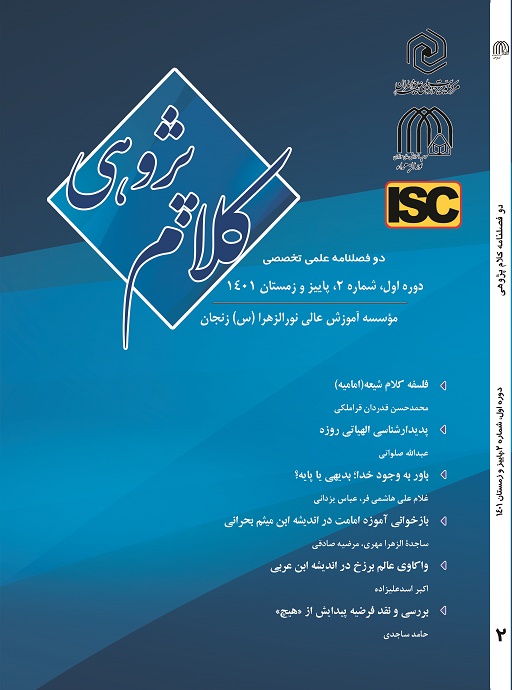نوع مقاله : مقاله پژوهشی
نویسندگان
1 دانش آموخته کارشناسی ارشد فلسفه و کلام اسلامی
2 استاد فلسفه دین دانشگاه تهران،
چکیده
برخی متفکران اسلامی درباره باور به وجود خدا با ارائه براهینی مانند برهان فطرت، برهان صدیقین و برهان تجربه دینی ادعای بداهت نمودهاند. هدف این پژوهش که با روش نظری- کتابخانهای و تحلیلی- انتقادی انجام پذیرفته، بررسی انتقادی بداهت ادعا شده در سه برهان یادشده خواهد بود. اهمیت توجه به افتراق میان بداهت و پایه بودن یک باور و فهم تفاوت آنها با یکدیگر، به گزارهای مانند گزارهی «خدا وجود دارد» نیز قابل تسری بوده و ما را در بررسی ادعای بداهت وجود خدا یاری خواهد رساند. نوشتار حاضر در صدد بیان این مطلب است که پایه دانستن باور به وجود خدا بهمعنای بدیهی بودن آن نیست. بدین قرار که با تحلیل مفهومی هر یک از مفردات این گزاره و نیز بررسی منابع معرفت، به تبیین ارتباط چنین باوری با معنای بداهت پرداخته و نتیجهای که حاصل میشود این است که هیچ یک از این براهین، قدرت اثبات بداهت وجود خدا را ندارند؛ نهایت چیزی که این سه نوع برهان به اثبات میرسانند موجه ساختن ادعای پایه بودن باور به وجود خدا بوده و صحبت از بداهت چنین باوری در براهین یادشده امری بلادلیل میباشد.
کلیدواژهها
عنوان مقاله [English]
Belief in the existence of God; self-evident or basic?
نویسندگان [English]
- Golamali Hashemifar 1
- abbas yazdani 2
1 دانش آموخته کارشناسی ارشد فلسفه و کلام اسلامی
2 استاد فلسفه دین دانشگاه تهران،
چکیده [English]
Some Islamic thinkers have contended that the belief in the existence of God is self-evident by presenting arguments such as the argument of Fitrah, the truthful argument, and the argument of religious experience. The purpose of this research that has been done by theoretical-library and analytical-critical methods, is a critical study of the claimed self-evidence in the three mentioned arguments. The importance of paying attention to the distinction between the self-evidence and the basis of a belief and understanding their difference from each other can also be extended to propositions such as "God exists" and will help us to examine the claim of the self-evidence of the existence of God. The present article seeks to state that knowing the basis of belief in the existence of God does not mean that it is self-evident. Thus, by conceptual analysis of each of the contents of this proposition and also by examining the sources of knowledge, the relation of such belief with the meaning of self-evidence will be explained and the result is that none of these arguments have the power to prove the self-evidence of God; Ultimately, what these three types of arguments prove is to justify the claim that belief in God is basic, and to speak of the self-evidence of such a belief in the above arguments is unreasonable.
کلیدواژهها [English]
- The Existence of God
- self-evidence
- Basic Belief
- Fitrah
- Truthful argument
- Religious Experience

